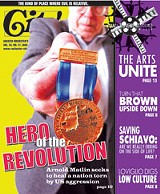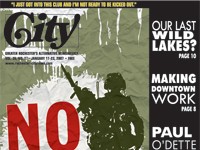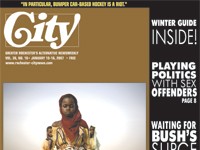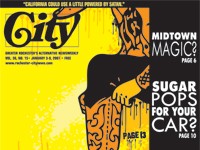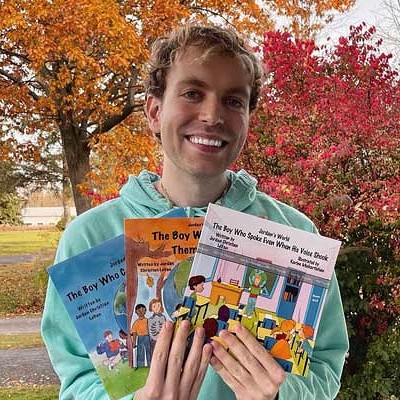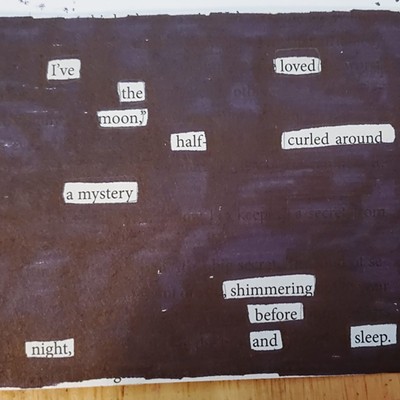[
{
"name": "500x250 Ad",
"insertPoint": "5",
"component": "15667920",
"parentWrapperClass": "",
"requiredCountToDisplay": "1"
}
]
It's not difficult to imagine Arnold Matlin as a pediatrician, the profession from which he recently retired after 33 years. With his restless energy and jovial demeanor, it's easy to picture him being as gentle as possible when a shot is necessary or coaxing infants to stick out their tongues.
But there's more to a person than his profession. Matlin, called Arnie by his friends, loves attending Gilbert and Sullivan operettas and watching figure-skating competitions. And in the basement of his Avon home he's got one of the most elaborate electric train sets you'll find in Western New York.
There's one other thing: In Nicaragua, Matlin has recently been declared a "Hero of the Revolution."
He is the only United States citizen ever to have received this medal, the Sandinistas' highest honor.
No, Matlin did not have a secret life as a revolutionary fighter. The battles he's waged have been fights to provide better health care and education in one of the poorest countries in the Western hemisphere. Since 1988, Matlin, his wife Margaret, and his two grown daughters have given far more than money to the Nicaraguan people. He and his family have been instrumental in bolstering health clinics, building a school, and providing scholarships to educate nurses.
In the town of El Sauce, Nicaragua, Matlin is indeed a hero. He was instrumental in Rochester's adoption of the town by way of a Sister Cities program (it's official in Nicaragua, unofficial in Rochester) and has helped its people in a variety of ways. But it's his motivation for all of this that may be the most fascinating aspect of his generosity.
"I make a lot of speeches in Nicaragua," Matlin says, "and every single time I say, 'Don't think I don't realize that the reason you need this help so much more is because of what my government did to your government.' Everybody who works in Nicaraguan solidarity feels the same way. We did terrible things to them. Fifty thousand people died in the Contra war, including Sandinistas and Contras. They're Nicaraguans too."
The Matlin family founded the Servicio Infantil Rural "La Norita," a Head-Start style program that gives 30 pre-school children per year a leg up on their education. Matlin, who will give a talk on Nicaragua next Tuesday, April 5, at SUNY Geneseo, won't reveal how much his family has spent on the program. But he will admit that the cost is well into five figures. The center, which employs two teachers, a gardener, a watchman, and a cook, has run smoothly since 1990. And it recently occupied a new state-of-the-art building paid for by the Japanese government.
"It's the best example of 'stone soup' I've ever seen," Matlin says. "The mayor wanted to give the land to us. We didn't want the land; it's not our turf, so a non-profit organization took the land. The woman who runs it went to the Japanese Embassy and asked if they wanted to build a school. Formal plans cost $1,000. That's a lot of money in Nicaragua. We had $1,000. The building cost $50,000, and it's going to last forever."
At least one member of the Matlin family visits the school once a year.
The center was actually the idea of Matlin's older daughter, Beth, a kindergarten teacher in Boston. Matlin's wife and his younger daughter, Sally, a bilingual advocate for female victims of domestic violence in Oakland, California, have also been deeply involved in Nicaraguan projects.
Matlin has helped in health care by giving medical lectures and bringing supplies. But perhaps his family's longest lasting contributions will be the fruits of the tuition scholarships they've provided for students in nursing school.
"They don't want air conditioning. They're not asking for a Hummer," he says. "They want to be able to go from practical nurse to registered nurse or from registered nurse to a bachelor's degree. It's very reasonable."
Matlin believes it's important not to impose aid on people; he says the community itself must be involved.
"You go down and talk to the people and ask, 'Do you want to build a community center? Will you help build it? Do you want to have a well? Do you want to raise chickens? Do you want to raise cows?'"
Raising cows is so significant that the website of Ciudad Hermana, the Sister City task force of Rochester's Metro Justice, is called PregnantCow.com. On the site, potential donors have a variety of choices. Among them: $25 purchases three chickens or a rooster, $100 will purchase two goats, $500 will purchase a pregnant cow. That last item is not only a practical commodity, it's a fitting metaphor for gifts that keep on giving.
"You buy the cow and you get the calf also, because the cow's been inseminated," Matlin says. "You get a loan, you've got to give it back to the next person. They call it a rotating or revolving loan. That's the better way to do charitable work, in my opinion."
With American troops in Iraq, turmoil in the Middle East, and power struggles in former Soviet Republics dominating the international news, Nicaragua may be just another country on the map. But during the 1980s, Nicaragua was near the top of the United States' foreign-policy obsessions.
In 1979, the Sandinistas (a revolutionary group named for liberal leader Augusto Sandino, who was murdered by right-wing forces in 1934) overthrew Nicaraguan dictator Anastasio Samosa. During his presidency, Ronald Reagan did everything he could to defeat the Sandinistas, including an economic embargo and aid to opposition fighters. With the Cold War raging, the rationale involved keeping Leftist governments out of the United States' sphere of influence in Central America.
This policy led to one of the most egregious abuses of power in US history. In what became known as the Iran-Contra scandal, the Reagan Administration sold weapons to Iran (a country that was our enemy at the time) to illegally fund the Contra rebels who were fighting to overthrow the Sandinista government.
"Why did the US want to do that?" asks Matlin. "It was the threat of a good example. If the Nicaraguans had taken over their own destiny and they were acting as a sovereign nation where people counted and it was working, the US couldn't stand that. That's not what we wanted."
The Sandinistas were finally defeated at the polls in 1990 and, despite repeated efforts by former president Daniel Ortega to win back the presidency, the Sandinistas have remained out of power on a national level since then. They have, however, gained recent footholds in local elections.
Matlin has ideas about why the Sandinista government could not survive US pressure.
"The embargo just broke the country's economy," he says. "Anybody who says the Sandinistas made economic mistakes... the answer is there was an embargo. They were trying to run a country and build a revolutionary country and at the height of the Contra War. Fifty Nicaraguans a day were dying. We're talking about serious problems here. We'll never know how well the Sandinistas would have done. I've heard economists say the Sandinistas were doing very well. The revolution was taking hold.
"I am not this super-sophisticated guy sitting here in his nice pleasant home that's heated in the winter and air-conditioned in the summer and saying 'Well, of course, the Sandinistas made mistakes,'" Matlin says. "I think the Sandinistas did great. They were brilliant in being able to overthrow Samosa, who was a bloody US-supported dictator. They were brilliant in being able to keep things together for 11 years despite all these attacks by proxy with the Contras and all of the economic attacks by the United States.
Matlin believes that if the Nicaraguans had been left alone they'd still be the government of Nicaragua and Nicaragua would be a far better place. He doesn't believe the question even has two sides. "I think the US was absolutely wrong in this. It was a terrible, evil thing we did, and we got away with it."
But Matlin also believes that if the Sandinista government had not been defeated, the US would have taken even stronger action. He points to Cold War-era military exercises on Honduras right across the Nicaraguan border and says the lesson was not lost on the Nicaraguans: The US can invade if it wants to.
"Frankly, I think that was on the table a lot --- a direct, US-armed military invasion of Nicaragua," he says. "I think it was considered many times. I think the fact that 100,000 very vocal people --- doctors, teachers, union leaders, ministers --- went down to Nicaragua, came back, and started to give lectures to the Rotary and to Kiwanis and their professional organizations and whoever else would listen kept that from happening."
Matlin is not ready to say all of that is in the past. He believes the United States may not be finished interfering in Nicaraguan politics.
He points to a February 24 column by Robert Novak titled "Sandinistas again creating problems in our backyard," published in newspapers throughout the country (but not in Rochester). Novak warns that the Sandinistas are slipping back into power in Nicaragua. He brings up the fact that Hugo Chavez, a Marxist who was elected president of Venezuela, is "spreading his 'Bolivarian Revolution' throughout the region."
It's no coincidence that Novak, considered by many to be a thinly veiled mouthpiece for Republicans and the Conservative movement, is signaling a need for renewed US interference in Nicaragua, Matlin says.
"Novak is preparing us that we might have to do it."
Matlin is also circulating a letter titled "Tell the US State Department hands off Nicaragua!"
In it he notes that Dan Fisk, US deputy assistant secretary of state, traveled to Nicaragua last November 4 to consult with political leaders on what he referred to as "democratic forces." By this, Matlin says, Fisk meant right-wing Nicaraguan political parties.
Matlin points to the fact that last year the Sandinistas won a large victory in municipal elections. He believes that Fisk visited Nicaragua to make sure the right-wing forces create a unified front to prevent the Sandinistas from regaining power.
Matlin may be reading the zeitgeist correctly. A New York Times article on March 21, titled "US suspends military aid to Nicaragua," discusses "rising tensions" over shoulder-launched antiaircraft missiles that the Nicaraguan Army has failed to destroy. The next day, in "The return of Latin America's Left," a Times op-ed column, Alvaro Vargas Llosa (a senior fellow at the Independent Institute and the author of Liberty for Latin America), noted the growing trend toward Socialist governments in the region.
If the US decides to take action, Matlin worries that the American public has become more docile in relation to our government's foreign policy.
"If anything, I think now the situation is worse than it was because now we don't have covert invasions. We just interfere overtly and lie about it," he says. "The Iran-Contra scandal --- if it happened in 2005 --- wouldn't be a scandal. Everybody would just applaud. We don't have the sense of outrage anymore. People were outraged about selling weapons to the Iranian government. I don't know if they were outraged because we sold them to Iran or by the fact that this was an absolute, direct way to get around the will of Congress, which after all represents the American people. And Congress said, with the Boland Amendment, you can't send any aid to the Contras."
Matlin owes his political outlook to his stint in the US Army. He was drafted in 1968, while he was in the middle of his medical residency at the University of Michigan.
"I always had strong feelings that things weren't right in the world and could be made better, but I didn't act on them in a political way until I got drafted into the Medical Corps," he says.
In 1969, Matlin and his wife felt strongly enough about the Vietnam War that they got on a bus near his Ft. Hamilton base and went to an anti-war mobilization in Washington DC. When he returned, he joined the group that founded the Staten Island Peace Coalition.
"I went to the meeting. Everybody's going around the room --- 'I'm a social worker,' 'I'm a labor organizer.' I said, 'I'm an Army Captain.' I remember Arlo Guthrie and the others; they all slid away from me on the bench."
Matlin was not deterred.
"The Army radicalized me," he says. "By the time I got out of the Army I was so furious with what was going on in Vietnam, I have never forgotten it. I have never slacked off since then. They probably should never have drafted me. I was a good doctor, I took care of the kids to the best of my ability, but I've given the military establishment a lot of trouble between then and now."
When Matlin left the Army, he did the final year of his residency at Strong Memorial Hospital and decided to settle in the area.
He moved to Livingston County and found there was no local peace group, so he, his wife, and two other couples formed Genesee Valley Citizens for Peace in 1972. After 33 years the group is still active, meeting once a month in members' homes.
In 1988, while attending a demonstration outside the Federal Building in Rochester, Matlin was asked by local activist Henrietta Levine if he would like to go to Nicaragua. He said yes and embarked on the first of his 21 trips to the nation.
"This was a poor country that had a revolution, and the revolution succeeded," he says. "The government cared about its people --- poor people. The Sandinistas had an outstanding health system. The Nicaraguan constitution says that health care is the right of the people and the responsibility of the government. Our constitution doesn't say that. We don't have any laws that say that either. So that's why I bonded to Nicaragua."
Over the decades Genesee Valley Citizens for Peace has had plenty of wars to consider, including Vietnam, the Gulf War, Afghanistan, and Iraq. But Matlin says he is not a pacifist.
"For example, I think the only way to overthrow the Samosa dictatorship was by an armed revolution," he says. "I think there are wars that are justified, I just haven't seen one since I've been old enough to recognize one. I have yet to see a war in which we've been involved that couldn't have been avoided by peaceful means."
When pressed, he agrees that situations of "ethnic cleansing" --- like recent events in Kosovo and Rwanda --- may be examples that would justify military action.
"I'm not saying there are not times that you need combat or wars," Matlin says. "I'm saying that nowhere in Central America have we been the least bit justified. We picked the side of repression and oppression and we ignored the will of the people. Why do you think they had those revolutions? They had those revolutions because the situation was so bad."
As for the recent wars in Afghanistan and Iraq:
"The Genesee Valley Citizens for Peace talk about hardly anything else," he says. "In terms of Afghanistan, we take the position that we shouldn't have destroyed a whole country because we were looking for Osama bin Ladin; we should have been concentrating on finding Osama bin Ladin.
"If the reasons given to invade Iraq were the reasons we invaded Iraq, they were wrong," Matlin says. "So why are we there? I don't see anything positive to be said about Iraq. I think it was blatant aggression, but my expertise doesn't extend to every armed conflict. As far as the solutions to the problems that face the world, I don't pretend to have them. But I know the US should keep its hands off the Nicaraguan elections."
Meanwhile, Matlin's work continues. He set up a program at the University of Rochester, where he's on the faculty. The school sends senior medical students for four-month rotations in El Sauce. Three of them will be leaving for Nicaragua at the end of March.
He's also organized a delegation to visit Nicaragua this spring. Everyone who goes will be traveling light.
"The saying has always been 'you take one suitcase for yourself and one suitcase for the Nicaraguans.' Sometimes we take school supplies. I take surgical gloves, bandages, Band-Aids, gauze, and basic medicines like Penicillin and Digitalis."
Despite his retirement from pediatrics, Matlin remains active as a doctor, teacher, and consultant. But he has more time for other interests. He's studying Renaissance Art History at SUNY Geneseo, where his wife is a professor of psychology. He's also had more time to travel and explore museums, churches, and cathedrals. During a recent stay in London, he and his wife "lived in the National Gallery."
But he remains most passionately interested in the people of Nicaragua. Does he see himself as a role model?
"Here's what my motto would be: If you're fortunate enough not to need help, you should help people who are unfortunate enough to need help," Matlin says. "That's a basic rule that I think goes for everybody everywhere. It isn't whether you're rich or poor, it's whether you want to help or not."
Nicaragua: Yesterday, Today, and Tomorrow, a talk by Arnie Matlin, takes place at 7 p.m. on Tuesday, April 5, room 201, Newton Hall, SUNY Geneseo.
Speaking of...
-
Reader feedback 5.4.05
May 4, 2005 -
Reader feedback 4.20.05
Apr 20, 2005 - More »
Latest in Featured story
More by Ron Netsky
-

Album Review | 'Bizet: Carmen in Jazz'
Mar 26, 2024 -
'To Swing Is the Thing" by Mike Melito
Aug 10, 2023 - More »
